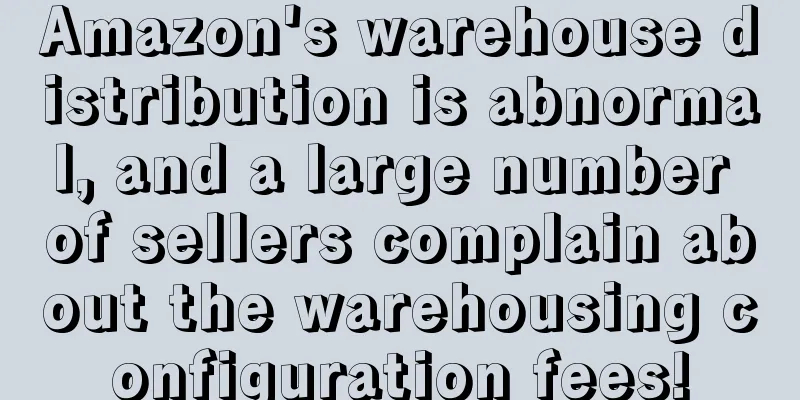Amazon's warehouse distribution is abnormal, and a large number of sellers complain about the warehousing configuration fees!

|
According to feedback from many sellers, this additional fee has a profound impact on Amazon seller operations.
According to the "Amazon Logistics Warehousing Configuration Service Fee for 2024" announced by Amazon, Amazon provides two warehousing configuration options to sellers on the US site: single-point warehousing and decentralized warehousing.
Among them, single-point warehousing is "minimum shipment splitting" , and sellers can send inventory to the least number of warehouses (usually one), while decentralized warehousing includes " partial shipment splitting (2-3 warehouses)" and " Amazon optimized shipment splitting (4 or more warehouses)". Amazon will distribute the inventory to the recommended warehouses.
Based on the feedback from sellers, many sellers have to pay a relatively high warehousing configuration fee under the "minimum shipment split" option. In comparison, the warehousing configuration fee charged for "dispersed warehousing" is lower, and there is even a chance to meet the conditions for exemption of configuration fees. Therefore, after the new policy came into effect, many sellers tried to save warehousing configuration fees by adding goods and dividing warehouses.
However, recently several sellers have said that Amazon's warehouse distribution seems to be abnormal: "Two hundred cartons, more than five thousand boxes, and Amazon won't let me split the warehouse. The configuration service fee is two thousand six hundred dollars!" "I sent out 100 boxes, but they didn't even give me a warehouse to split them. The service fee is too expensive..."
For this reason, some sellers even questioned whether Amazon wanted to force them to charge fees.
However, some sellers also mentioned that the “Amazon Optimized Shipment Splitting” option requires that the warehousing plan meets the requirements before it can be selected normally. In addition to the quantity of shipments, there are other factors that affect the warehousing options. Therefore, the above-mentioned sellers may not have understood the requirements for warehouse splitting.
According to Amazon's announcement, Amazon will consider a variety of factors when providing warehousing configuration options. The corresponding warehousing configuration options will only be displayed when the seller's shipment meets the requirements. The factors that affect the number of warehousing options include:
Therefore, if Amazon sellers want to maximize the number of warehousing options, in addition to increasing the number of boxes, they also need to pay attention to these important factors. You can try to create separate shipments for the products and ensure that the product combination and quantity in all boxes are the same.
It is worth mentioning that now, under the influence of the warehousing configuration fee, many sellers have chosen "Amazon optimized shipment splitting" and divided it into four or more warehouses to avoid this fee in order to achieve the goal of reducing costs.
However, contrary to expectations, there are also considerable risks hidden behind the warehouse operation: in addition to increasing the first-leg freight cost, due to the different transportation conditions of different shipments, product operations also face greater risks of instability.
After the warehousing configuration fee was implemented, some sellers revealed that if they choose "Amazon Optimized Shipment Splitting" , the Amazon system will often match the shipments to unpopular warehouses in the eastern or central United States, which has poor timeliness. Not only may they be charged a warehousing defect fee, but the store may also face a stockout crisis, while losing logistics costs and time costs.
From this point of view, the strategy of choosing a warehouse splitting strategy to avoid the warehousing configuration fee is not suitable for all sellers. When considering the warehousing configuration options, sellers should also take into account factors such as logistics timeliness, product size, and product quantity, and make more detailed calculations and measurements to avoid greater losses.
In addition to the warehousing configuration fee, other fees newly added by Amazon this year have also attracted the attention of many sellers. It is learned that at the end of 2023, Amazon issued an update notice on sales commissions and logistics fees, adding several new charging items, which caused an uproar in the industry.
In brief, the key points of these new charges are as follows:
On the surface, these additional fees seem to only increase the cost burden for sellers, but some sellers pointed out sharply that these adjustments made by Amazon have also greatly increased the difficulty of operations, requiring sellers to improve their inventory management capabilities. It is understood that according to previous relevant announcements, Amazon said that it launched a warehouse configuration service fee to help sellers optimize inventory management and improve operational efficiency ; and the change in return processing fees is to solve the cost of returns and reduce waste .
Not long ago, at the "2024 Amazon Export Cross-border Logistics Accelerator Program" meeting, Amazon also responded to the new fees, stating that the original intention was to bring the distance between goods and consumers as close as possible, and hoped to work with sellers to make regional layouts. It also suggested that sellers provide deeper inventory and ensure sufficient inventory.
From this point of view, it seems that these fees charged by Amazon are intended to enable sellers to achieve “fast in and fast out of goods” and improve warehouse utilization.
Therefore, it is foreseeable that as these fees take effect one after another, problems such as rising costs and increased operational difficulties will pose new challenges to sellers. If Amazon sellers can do a good job of inventory management, create a more stable stocking cycle and sales rhythm, and avoid out-of-stock situations, they can greatly reduce operating costs. What do you think about this? Welcome to discuss in the comment area~ |
Recommend
What is Bumble? Bumble Review
Bumble is a unique social networking app that effe...
What is a classification tree? Classification tree evaluation
On any shopping website (Amazon/eBay/AliExpress, e...
The US holiday shopping season is about to begin! More than 70% of online consumers choose Amazon!
A new survey from shopping and rewards app Shopkic...
[Follow-up] Sales increased 8 times in half a year, and I became an Amazon manager
Preface of the Little Clone: The student follow-u...
Auto parts LED category is banned! More than 30% of sellers start selling at low prices!
This year's peak season is a "tumultuous ...
What is Craigslist? Craigslist Review
Craigslist is a large-scale free classified advert...
What is ROTHY'S? ROTHY'S Review
ROTHY'S is an environmentally friendly women...
With one million SKUs sold for 6.5 billion, the distribution king Yibai has completed the bet for five consecutive years!
Customs statistics show that China's cross-bor...
U.S. online grocery sales increased 18.7% year-on-year in December, with strong performance in the second half of the year
It is learned that on January 14, according to for...
What is the Foreign Trade Hall of Fame? Foreign Trade Hall of Fame Review
The Hall of Fame is the core user organization of ...
What is AsinSeed? AsinSeed Review
ASINSeed is a keyword analysis software for the Am...
What is RocketHub? RocketHub Review
RocketHub is one of the largest online crowdfundin...
Check yourself! 2500 listings were deleted just because there was a problem with the category!
Amazon has been sending out a lot of warning emai...
What is clorys? Clorys Review
Clorys is an international fast fashion e-commerce...
What is Blisby? Blisby Review
Blisby was founded in November 2013. It is a Thai ...









